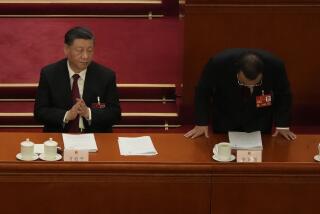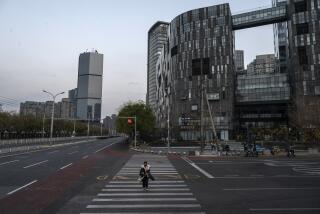China’s GDP Figures in Doubt
BENGBU, China — On a gray Friday morning in February, Liu Min quietly went up to the ninth floor of an atrium building here, climbed over a 4-foot railing and plunged to his death onto the marble floor below.
The suicide might have drawn little attention, especially in one of China’s poorer provinces, except that it happened in Bengbu’s municipal government building and that the dead man was chief of the city’s statistics bureau.
His neighbors and others in Bengbu suspect that the 48-year-old Liu, who left behind a wife and son, faced intense pressure as the person in charge of generating economic growth data. Just weeks before Liu’s death, city officials proclaimed a stunning 16.5% increase in gross domestic product for 2004 -- nearly triple the GDP increase of the year before.
Although authorities have said little publicly about Liu’s suicide, the incident has cast a spotlight on what has been a long-standing problem in China: an obsession with GDP growth.
Economic progress has been a top priority for Beijing. But it has been more like a religion in many regions, whose officials have gained recognition and won promotions based on achieving top GDP growth rates. The upshot is that for years, many provinces, counties and cities have submitted fraudulently inflated statistics.
Last year was no exception. Although China posted a sizzling growth rate of 9.5%, nearly all of the major regions reported GDP increases that were even higher. Based on these local reports, China’s top government statistician said, the country’s GDP growth for last year should have been as much as 15.5%.
This charade was tolerated in the past. But more recently, it has become an embarrassment to the central government as foreign investors and analysts, among others, have come to question the credibility of China’s statistics. In the annual legislative session that opened last week, Chinese Premier Wen Jiabao openly criticized the “blind competition” among local governments to post high GDP growth rates.
Beijing has vowed to crack down on the fabrication of economic data and has urged local governments to reconsider how officials are promoted.
Yet that won’t be easy to do, underscoring China’s rocky transition to a market economy.
For one thing, economists say, it’s hard to judge who’s telling the truth.
GDP is typically calculated by adding up measures of consumption, investment, government expenditures and net exports. But at the local level, production (rather than spending) is often tallied instead. And it’s not hard for provincial officials -- derisively referred to by some as “GDP governors” -- to gin up bogus records.
Cai Zhizhou, vice director of Peking University’s China Center for National Accounting & Economic Center in Beijing, visited various areas in China and investigated their statistics. Although he would not comment specifically about Bengbu, Cai said “we did notice that in some places, government officials would ask local statistics bureaus to give a higher estimate of GDP.”
“As a result,” he added, “some bureau chiefs had to make an artificially high GDP under pressure.” (In the U.S., by contrast, few pay attention to local economic growth numbers, if they are calculated at all.)
Bengbu’s economic expansion of 16.5% followed a relatively modest GDP increase of 6.4% in 2003. That same year, Bengbu’s new mayor launched a project aimed at realizing a 10% GDP growth rate annually through 2007, and the fruits of that program can be seen in this Anhui Province city of about 3 million.
In one section of Bengbu, which is about 350 miles west of Shanghai, old houses have been demolished and residents displaced to make room for thousands of new apartment units. Nearby, the city recently completed a cultural square with a new library, a grand theater and a sleek convention center whose curves evoke an open book.
Bengbu’s main industries are food-related, but the city also has numerous factories producing chemicals, pharmaceuticals and building materials. Despite layoffs at state-owned enterprises, some residents say economic conditions here have generally improved. Still, they doubt that GDP growth tripled last year.
Analysts are incredulous too. They say it’s unlikely that a boost in government spending could have contributed that much to Bengbu’s spectacular GDP growth rate. Bengbu officials explained that agricultural GDP surged 35% in 2004. Yet China’s average farm output grew just 3% to 5% last year.
Many say it’s not a surprise that regional leaders throughout China have placed so much emphasis on development, absent other criteria for evaluating an official’s performance and promotion. Besides, Communist Party leaders themselves have staked their legitimacy on economic improvement.
In Communist China’s early period, during Mao Tse-tung’s Great Leap Forward campaign of 1958, which sought to ramp up economic and technical development, data on production and other measures of progress also were exaggerated, helping trigger a shortage of food and other economic and social ills.
Experts say that today’s regional leaders, who are usually in office for no more than four years, will often go all out to foster development -- borrowing heavily or risking damage to the environment -- while knowing that they will have been promoted by the time those bombs go off.
As for Liu, he had been chief of Bengbu’s Statistics Bureau since February 2002, having previously worked as deputy chief of the city’s Price Bureau.
Bengbu officials declined to comment about the circumstances around Liu’s death on Feb. 18, referring questions to Anhui Province, which did not provide comment.
But local Chinese media reported that Bengbu’s Security Bureau attributed Liu’s suicide to psychological anxiety disorder. According to news accounts, a colleague in the Statistics Bureau said that Liu complained about unbearable pressure before his death.
Liu had lived in a middle-class neighborhood on the fourth floor of an apartment complex behind a nursing school, where his wife worked as an administrator. Their son is a college student.
Liu’s wife has declined to speak to the media. She did not answer telephone calls or knocks on her door last week.
Some of her neighbors said she and her late husband had been a happy couple. But in the last couple of years, signs of strain were increasingly visible on Liu’s face, said one longtime acquaintance who saw him often when a government car pulled into the complex driveway to pick him up for work in the mornings.
The acquaintance, who asked not to be named, said many people in the neighborhood believed that Liu’s death had something to do with the economic data. This person and others said they could think of no other reason why he would take his own life.
More to Read
Sign up for Essential California
The most important California stories and recommendations in your inbox every morning.
You may occasionally receive promotional content from the Los Angeles Times.











